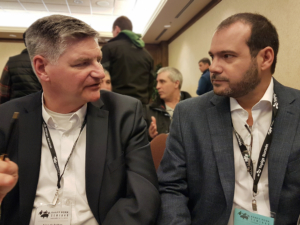A talented manager is the single most important factor in determining the success of a hog farm, says the Chilean veterinarian who led the design and set-up of a 10,000-sow farm in Mexico.
Gustavo Pizarro, member of the Pipestone Veterinary Services Team, discussed during a breakout session at Banff Pork Seminar the principles around which the farm was built, the standards of practice set out for the farm and the results it has produced for its owner, the Soles pork company based in northwest Mexico.
At his side was farm manager Ezequiel Guardado, leader of a staff of 42 people. The farm, which Pizarro called “the monster” because of its size in  relation to other Mexican sites, was set in an isolated area of Northern Mexico where there is access to lots of good water, roads and labour. The farming culture of the area was also an important consideration in choosing the site, said Guardado.
relation to other Mexican sites, was set in an isolated area of Northern Mexico where there is access to lots of good water, roads and labour. The farming culture of the area was also an important consideration in choosing the site, said Guardado.
With all things considered, however, the ability of the manager to build and maintain a strong team has made the biggest difference in how well the farm meets its owner’s targets, he said.
Pizarro said he has worked with all kinds of farm managers during his veterinary career but has never met one who is as good as Guardado – who did not address the crowd because he does not speak English.
“I can hold in one hand the people that are extremely good. I think this is the best one I have ever met. I have never seen one guy with more clear leadership, and he’s good at identifying the pigs, what’s going on. I will try to translate his sentence the best that I can: ‘The words convince, but you lead by example.’”
In an interview afterward, Pizarro said extraordinary skill with people is what sets him apart from other farm managers.
Now in its third parity, the new farm has continued to exceed breeding targets Soles had set for Guardado and crew.
During the 49-week period summarized in Pizarro’s presentation, the farm averaged 6,002 pigs weaned per week and there was an expectation that 317,000 pigs would be weaned in 2017.
The company’s decision to build and the location selected were based on several factors, said Pizarro.
Some of the toughest lessons learned were realized with the outbreak of PEDv and the inability of Mexican farms on the traditional open-air model to address the biosecurity issues raised as a result.
The new farm was built on a compact design, with tightly controlled entry points and an interior design meant to be as comfortable as possible for people and pigs.
Nursery protocols were set up to minimize piglet mortality in every way possible, including assisting the sow to minimize her pain, making sure the piglets are warm and dry and ensuring that each one gets its colostrum.
In a break from the trend that has developed in Canada and the United States, the decision was made to use gestation stalls rather than loose housing for sows and gilts.
The company felt the stalls would provide a safer and healthier environment for its stock and did not feel obliged to consider loose housing because it is not required in Mexico, said Pizarro.
Asked for his impression about the start-up afterward, Alberta-based farm manager Scott Hyshka said the only real difference involves the higher ration of pigs per people and the dedication of the staff to their jobs.
“I don’t think it was an amazing feat. I think it shows what is possible and what we could shoot to achieve with people,” said Hyshka.
“One hundred per cent of their staff are passionate about what they do, where we struggle to find people who are passionate about what they’re doing.”
Getting the same level of passion from people working on Canadian farms would produce similar results said Hyshka. “It’s not rocket science. We have protocols that can deliver those results. It’s getting the consistent performance from all of us, right from the top down to the bottom,” he said. You can teach people how to look after pigs and how to keep systems running, but the people skills that are so vital for a good manager are more difficult to develop, said Greg Meek, sow production manager for Smithfield Foods in Colorado.
“When you get a good one like that – I’ve developed a few that have absolutely no education, but they listen and they implement and they become just phenomenal managers, and that gives me great reward as their mentor, to watch them grow and develop within the system.” •
— By Brenda Kossowan





